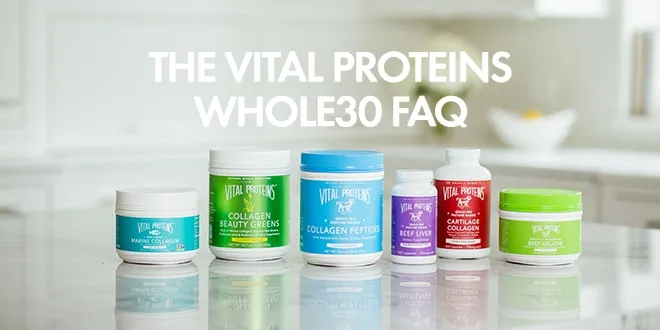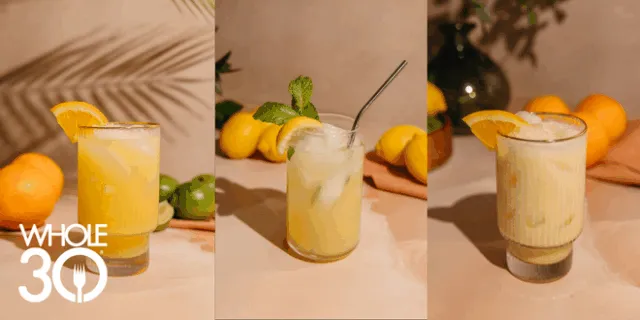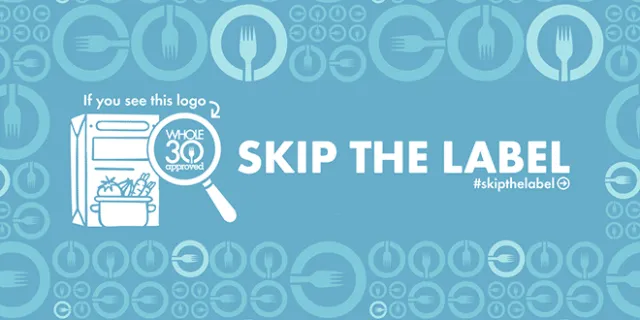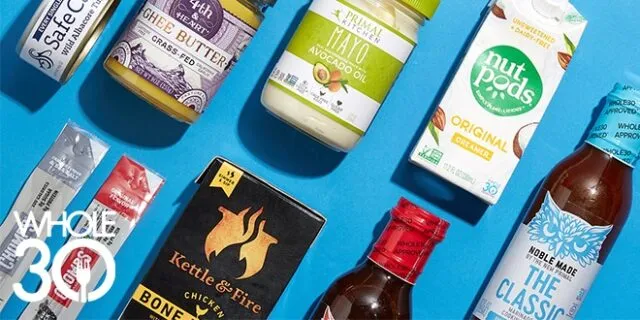You’ve probably heard the Whole30 team talking about Vital Proteins collagen on social media, in Melissa’s Facebook Live discussion and in this Facebook Live with Shanna and Shannon from Vital Proteins. Today, Whole30 headmistress Melissa Urban is going to answer your most pressing questions about collagen as it pertains to the Whole30 and your food freedom.
A Collagen Primer
- Collagen is the most abundant protein in your body. It’s found in muscles, bone, skin, and connective tissue like tendons, and basically holds the whole body together, providing strength and structure. It’s important for healthy skin, hair, nails, and teeth; maintaining healthy joints and reducing the risk of joint degeneration, and helps to heal a leaky gut.
- Collagen is full of non-essential amino acids, most notably glycine and proline. The proline and glycine found in collagen are also building blocks of creatine, a compound formed during protein metabolism. Creatine is involved in the supply of energy for muscular contraction, and promotes healthy muscle growth and boosts energy production during a workout.
- Under normal circumstances, your body will produce these non-essential amino acids, but when you’re sick or under stress, your body may not be able to produce enough on its own. Other factors (like sun exposure, sugar consumption, and smoking) will hasten the decline of collagen in the body. Finally, collagen production naturally declines as we age.
- This reduces the structural integrity of the skin and leading to sagging skin, the formation of lines and wrinkles, and the weakening of cartilage in joints, making you less flexible and making bones weaker.
- We used to get collagen and these aminos in our diets in the form of bones and broth (eating the whole animal), but in today’s modern world, we’re highly unlikely to consume foods like bone marrow, or boil pasture-raised bones down for broth. The aminos found in collagen aren’t found in significant amounts in the muscle meat we eat or the protein supplements (like whey or BCAAs) we take post-workout. This means that today, we’re not getting a steady or adequate supply of collagen, glycine, or proline in our diets.
- Taking a collagen supplement can help keep our skin smooth and supple, our nails and hair strong and healthy, our joints strong and flexible, and our guts healthy. As a fitness supplement, it complements the protein and BCAAs we’re taking to ensure creatine production is high, muscles are strong, and we are able to maintain energy during training sessions. It’s also highly bioavailable, easy to be absorbed and utilized in the body.
Why Vital Proteins (versus other brands)?
- Product innovation: their Beauty Greens are specifically targeted to women looking for a natural way to improve skin, hair, and nails; Marine Collagen is a good fit for pescetarians or those with bovine allergies. Blends like their Beauty Greens (made with their Non-GMO Marine Collagen), Dark Chocolate & Blackberry Collagen Peptides, Mixed Berry Collagen Peptides and Vanilla Collagen Peptides offer more than just collagen, incorporating skin, hair, and nail improving ingredients like hyaluronic acid and probiotics. Their assortment of Collagen Beauty Waters are specifically targeted to women looking for natural beauty-boosting benefits that work from the inside out. Collagen Bone Broth is a Whole30 pantry item, especially helpful as a broth base for Whole30 soups and other dishes.
- Truly flavorless: VP collagen peptides are (compared to other brands I’ve tried) truly flavorless. This makes them ideal to add to water, coffee or tea, or as added protein in scrambled eggs, mashed sweet potato, or other foods.
- Sourcing: It used to be collagen was made from “leftover” parts, but today we understand so much more about how the health of the animal plays into the quality of the products made from their meat, organs, bones, and hides. Vital Proteins collagen is all pasture-raised cows or wild-caught fish.
- Ethically-sourced, simple ingredients are the foundation of every Vital Proteins product.
- Social community: Vital Proteins has a vibrant social media presence with tons of value-added, including recipes, testimonials, and lifestyle, health, and fitness tips, which means our community has a ton of great resources straight from the source. They’re also very generous with giveaways… stay tuned later this week!
The Vital Proteins Collagen FAQ
Are all Vital Proteins products Whole30 approved? All but their Collagen Whey Proteins line. (Because, you know, whey.) However, if you tolerate whey well during your Whole30 reintroduction and decide to reincorporate it back into your fitness routine, the combination of BCAAs, proline, and glycine in this particular blend make it the ideal post-workout supplement. So you’re saying there IS a Whole30 Approved protein powder? Kind of… but not the way you think. Vital Proteins collagen is a whole food supplement, much like bone broth, providing you with valuable-but-missing nutrients in your modern diet. But you’re not going to want to use Collagen Peptides post-workout as a substitute for the whey or soy protein you used to use. That’s because the amino acid profile is totally different; collagen doesn’t contain the same branch-chain amino acids (BCAAs) that are so important for muscle recovery post-workout. Don’t think of these products as adding extra protein to your day (although they will, to a small degree)… think of them as adding a valuable source of scarce amino acids and skin/hair/nail/joint/gut-building compounds to your already healthy diet. What about the wheat grass or barley grass in the Beauty Greens? I thought grains were out. The Beauty Greens uses wheat and barley grasses, but these shouldn’t be confused with grains themselves. As I explained in It Starts With Food, the problematic components of grains are found in the seed, but the grasses from these plants don’t contain any of the components the Whole30 is concerned with (like gluten). As such, they’re fine to consume during the Whole30, and this product is Whole30 Approved. Collagen vs. gelatin: what’s the diff? Gelatin is the by-product of boiling down the collagen in bones, connective tissue, and hides. It contains the same amino acids and protein, but it needs to be dissolved in boiling water, then cooled to “set.” (Think Jell-O.) While this form is awesome for making protein-rich no-sugar-added gummy supplements, it’s not so convenient to blend into just about anything on the go. That’s where collagen peptides come in; they mix into absolutely anything (liquid or solid) and are flavorless and odorless. Bovine collagen vs. marine collagen: what’s the diff? Just the source—collagen from cows vs. collagen from fish. Their Marine Collagen is a good choice for pescetarians or those with a bovine (beef) allergy or sensitivity. If I’m only going to order one product, which would you recommend? That depends on your primary reason for using their collagen. If you’re specifically looking for glowing skin, thicker hair and stronger nails, the Beauty Greens have additional nutrients designed to maximally support those systems. However, the “green” part means it’s not as easy to add to coffee, tea, or scrambled eggs, so there is less versatility. If you want something you can effortlessly add into your everyday routine in a variety of formats, try the Collagen Peptides. (You can also order both and rotate, which is what I do.) Is it REALLY tasteless? Like, really? Here’s how I describe it: it tastes like something, but it doesn’t taste like anything. (You’re welcome.) Seriously, you’ll maybe know something is in there, but I promise you won’t have any funky flavors, aftertastes, or weirdness. What’s my recommended “dose?” As with any supplement, more doesn’t equal better. Too much collagen all at once can promote bloating or constipation, so start off easy. Try one serving (generally a scoop) per day, either all at once or split into two “doses.” If that feels great, you can always try a scoop in the AM and one PM, or one scoop of the Collagen Peptides or Mixed Berry Peptides in the morning and a scoop of the Lavender Lemon Water in the afternoon. How can I work these products into my Whole30? Here’s what I do; either take inspiration from my routine, or just flat-out steal it. First, I wake up and fill a one-liter water bottle with cold water, then mix in half a scoop of either the Collagen Peptides or Beauty Greens. I drink from that all morning, until it’s gone. Then, after my workout, I put half a scoop in my hot decaf coffee, mixed with my Whole30 Approved nutpods. (Sounds weird, but I swear, Collagen Peptides + coffee or tea is magically creamy and delicious.) That’s it! Extra collagen, mixed effortlessly into stuff I’m already drinking.
Are there recipes? Oh yes, all created by bloggers far more creative than me. The Vital Proteins Instagram feed features recipes using their products, as does their blog. (Note, not all recipes are Whole30 compatible, so read your ingredients carefully.) You can use their Gelatin to make Stupid Easy Paleo’s fruit juice-based gummies or Kombucha gummies (both Whole30 compatible), and stay tuned, because we’ll be bringing you some great Whole30 recipes right here on the blog later this week. Where can I buy Vital Proteins? You can buy Vital Proteins products on their website (free shipping!) and at a number of retailers in the US – Whole Foods and Vitamin Shoppe being some of the larger, but check out their store locater for retailers in your area. You can also purchase Vital Proteins as part of our Whole30 kits through Barefoot Provisions.
Continue the discussion...
If you have more questions about Vital Proteins products or want to share your favorite way to incorporate them into your #SeptemberWhole30, connect with Vital Proteins on Instagram, Facebook, Twitter, or Snapchat (@vitalproteins)! This post was sponsored by Vital Proteins, a Whole30 affiliate partner

















